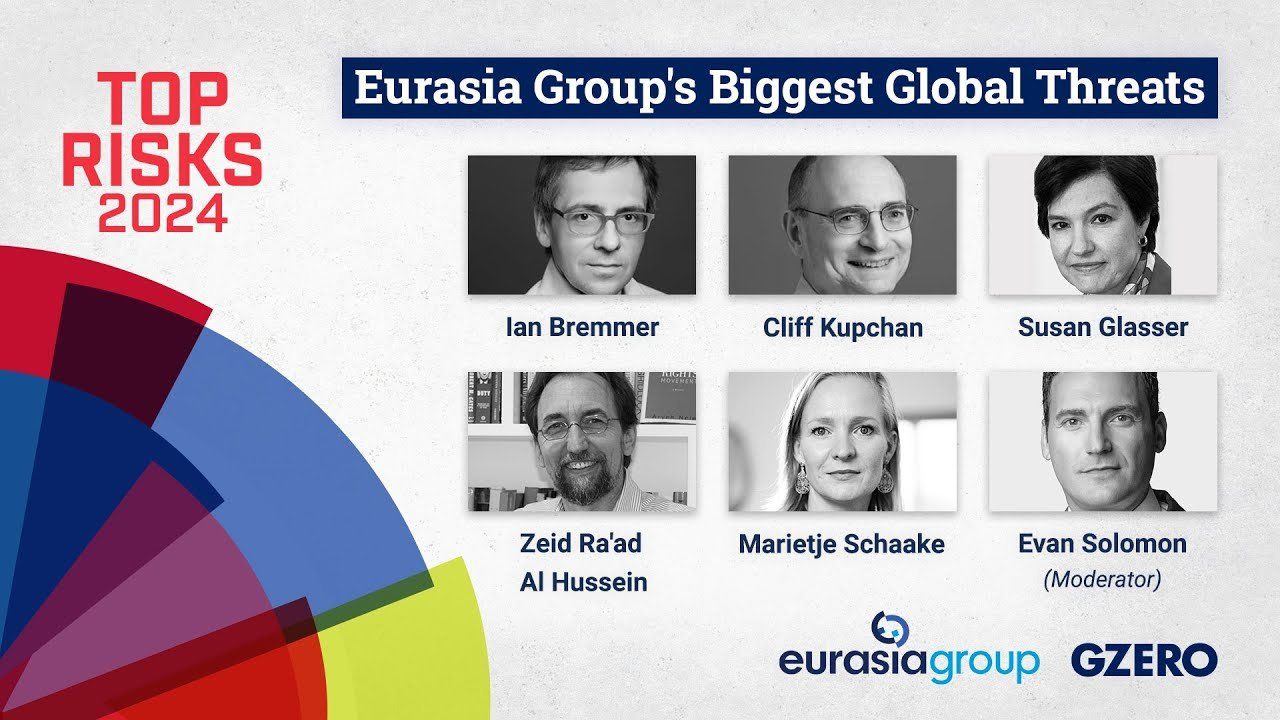Past Events
A world of conflict: The top risks of 2024

Top Risks 2024 with Ian Bremmer, Cliff Kupchan, Zeid Ra'ad Al Hussein, and Marietje Schaake

2024 is shaping up to be a turbulent year. The war in Ukraine is heading into a stalemate that puts the country on the road to partition. Israel's invasion of Gaza risks expanding to a region-wide war. And in the United States, the presidential election is pitting a divided country against itself with unprecedented risks for its democracy. Throw in AI growing faster than governments can keep up, China's rumbly grumbly economy, and El Nino weather, and you're starting to get the picture.
All those trends and more made it onto Eurasia Group's annual Top Risk project for 2024. As a political risk consultancy, Eurasia Group strives to keep clients informed of the global affairs that will impact their interests and bottom lines. The Top Risks project takes the view from 30,000 feet every year, summarizing the biggest and most dangerous unknowns that will affect everyone, political junkie or not.
GZERO Publisher Evan Solomon sat down with Eurasia Group Founder and President Ian Bremmer and Chairman Cliff Kupchan to work through their list of Top Risks for 2024 alongside Susan Glasser, staff writer at The New Yorker and co-author of "The Divider: Trump in the White House, 2017-2021"; Zeid Ra'ad Al Hussein, CEO & President of the International Peace Institute and former United Nations High Commissioner for Human Rights; and Marietje Schaake, International Policy Fellow, Stanford Human-Centered Artificial Intelligence. The big throughline this year? Events spiral out of control even against the wishes of major players. Whether it's possible escalation between Israel and Iranian proxies, Chinese retaliation to the result of the Taiwanese election, or central banks finding themselves squeezed into a corner by persistent inflation, the sheer number of moving parts presents a risk in and of itself.
Take a deep dive with the panel in our full discussion, livestreamed on Jan. 8.
Xi Jinping has spent three years gutting his own military leadership. Five of the seven members of the Central Military Commission – China's supreme military authority – have been purged since 2023, all of whom were handpicked by Xi himself back in 2022.
In this episode of GZERO Europe, Carl Bildt examines how an eventful week in Davos further strained transatlantic relations and reignited tensions over Greenland.
In this episode of "ask ian," Ian Bremmer breaks down the growing rift between the US and Canada, calling it “permanent damage” to one of the world’s closest alliances.
For China, hitting its annual growth target is as much a political victory as an economic one. It is proof that Beijing can weather slowing global demand, a slumping housing sector, and mounting pressure from Washington.